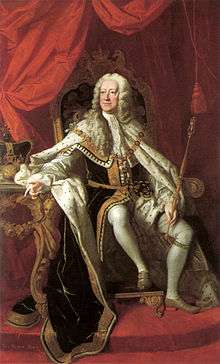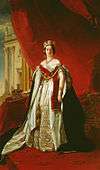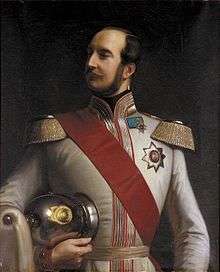House of Hanover
| House of Hanover | |
|---|---|
 | |
| Country | |
| Parent house | |
| Titles | etc., etc., etc. |
| Founded | 1635 - George, Duke of Brunswick-Lüneburg |
| Current head | Ernst August, Prince of Hanover |
| Dissolution |
United Kingdom: Hanover: 1918 - Ernest Augustus of Brunswick forced to abdicate after German defeat in World War I |
| Ethnicity | German |
The House of Hanover (or the Hanoverians /ˌhænəˈvɪəriənz, -noʊ-, -ˈvɛr-/;[1][2] German: Haus Hannover) is a German royal dynasty that ruled the Electorate and then the Kingdom of Hanover, and that also provided monarchs of Great Britain and Ireland from 1714 and ruled the United Kingdom until the death of Queen Victoria in 1901. Upon Victoria's death, the British throne passed to her eldest son Edward VII, a member of the House of Saxe-Coburg and Gotha through his father. The House of Hanover was formally named the House of Brunswick-Lüneburg, Hanover line, as it was originally a cadet branch of the House of Brunswick-Lüneburg. The senior branch became extinct in 1884, and the House of Hanover is now the only surviving branch of the House of Welf, which is the senior branch of the House of Este. The current head of the House of Hanover is Ernst August, Prince of Hanover.
History
Dukes and Electors of Brunswick-Lüneburg
George, Duke of Brunswick-Lüneburg, is considered the first member of the House of Hanover. When the Duchy of Brunswick-Lüneburg was divided in 1635, George inherited the Principality of Calenberg and moved his residence to Hanover. His son, Christian Louis inherited the Principality of Lüneburg from George's brother. Calenberg and Lüneburg were then shared between George's sons until united in 1705 under his grandson, also called George, who subsequently became George I of Great Britain. All held the title Duke of Brunswick-Lüneburg. George died in 1641 and was succeeded by:
- Christian Louis, 1st son of Duke George, Prince of Calenberg (1641–1648) and Prince of Lüneburg (1648–1665). He relinquished Calenburg when he became Prince of Lüneburg.
- George William, 2nd son of Duke George, Prince of Calenberg (1648–1665) and Prince of Lüneburg (1665–1705). He relinquished Calenburg when he became Prince of Lüneburg on the death of his brother, Christian Louis.
- John Frederick, 3rd son of Duke George, Prince of Calenberg (1665–1679).
- Ernest Augustus, 4th son of Duke George, Prince of Calenberg (1679–1698). He became Prince of Calenberg on the death of his brother John Frederick. He was elevated to prince-elector of the Holy Roman Empire in 1692. Ernest Augustus's wife, Sophia of the Palatinate, was declared heiress of the throne of England by the Act of Settlement of 1701, which decreed Roman Catholics could not accede to the throne. Sophia was at that time the senior eligible Protestant descendant of James I of England.
- George Louis, son of Duke Ernest Augustus and Sophia, became Elector and Prince of Calenberg in 1698 and Prince of Lüneburg when his uncle George William died in 1705. He inherited his mother's claim to the throne of Great Britain when she died in 1714.
Monarchs of Great Britain and the United Kingdom and Electors and Kings of Hanover
George Louis became the first British monarch of the House of Hanover as George I in 1714.[3]:13 The dynasty provided six British monarchs:
Of the Kingdoms of Great Britain and Ireland:
- George I (r.1714–27) (Georg Ludwig = George Louis)
- George II (r.1727–60) (Georg August = George Augustus)
- George III (r.1760–1820)[4]
Of the United Kingdom of Great Britain and Ireland:
- George III (r.1760–1820)
- George IV (r.1820–30)
- William IV (r.1830–37)
- Victoria (r.1837–1901).
George I, George II, and George III also served as electors and dukes of Brunswick-Lüneburg, informally, Electors of Hanover (cf. personal union). From 1814, when Hanover became a kingdom, the British monarch was also King of Hanover.
.svg.png) Arms of the Hanoverian Kings of the United Kingdom (1801–1837)
Arms of the Hanoverian Kings of the United Kingdom (1801–1837).jpg) George I (1714–1727)
George I (1714–1727) George II (1727–1760)
George II (1727–1760) George III (1760–1820)
George III (1760–1820) George IV (1820–1830)
George IV (1820–1830) William IV (1830–1837)
William IV (1830–1837) Victoria (1837–1901)
Victoria (1837–1901)
In 1837, however, the personal union of the thrones of the United Kingdom and Hanover ended. Succession to the Hanoverian throne was regulated by semi-Salic law (agnatic-cognatic), which gave priority to all male lines before female lines, so that it passed not to Queen Victoria but to her uncle, the Duke of Cumberland.[3]:13,14 In 1901, when Queen Victoria died, her son and heir Edward VII became the first British Monarch of the House of Saxe-Coburg and Gotha, Edward taking his family name from that of his father, Prince Albert of Saxe-Coburg-Gotha.[3]:14
Kings of Hanover after the breakup of the personal union
After the death of William IV in 1837, the following kings of Hanover continued the dynasty:
- Ernest Augustus I (r. 1837–1851)
- George V (r. 1851–1866, deposed)
 Coat of arms of the Kingdom of Hanover 1837
Coat of arms of the Kingdom of Hanover 1837- Alternate drawing of the coat of arms
- King Ernest Augustus I of Hanover (1837–1851)
 King George V of Hanover (1851–1866)
King George V of Hanover (1851–1866)
The Kingdom of Hanover came to an end in 1866 when it was annexed by Prussia. The 1866 rift between the House of Hanover and the House of Hohenzollern was settled only by the 1913 marriage of Princess Viktoria Luise of Prussia to Ernest Augustus, Duke of Brunswick.
Prince-bishops of Osnabrück
At the end of the Thirty Years' War, the Peace of Westphalia (1648) awarded the Prince-Bishopric of Osnabrück alternately to a Catholic bishop and to a cadet branch of Brunswick-Lüneburg.[5] Since the treaty gave cadets priority over heirs and reigning princes, Osnabrück became a form of appanage (in alternation) of the House of Hanover.
- Ernest Augustus, Elector of Brunswick-Lüneburg (r. 1662–1698), fourth son of George, Duke of Brunswick-Lüneburg
- Ernest Augustus, Duke of York and Albany (r. 1715–1728), sixth son of Ernest Augustus, Elector of Brunswick-Lüneburg
- Prince Frederick, Duke of York and Albany (r. 1764–1802), second son of George III
Osnabrück was mediatized to Hanover in 1803.
Dukes of Brunswick
In 1884, the senior branch of the House of Welf became extinct. By semi-Salic law, the House of Hanover would have acceded to the Duchy of Brunswick, but there had been strong Prussian pressure against having George V of Hanover or his son, the Duke of Cumberland, succeed to a member state of the German Empire, at least without strong conditions, including swearing to the German constitution. By a law of 1879, the Duchy of Brunswick established a temporary council of regency to take over at the Duke's death, and if necessary appoint a regent.
The Duke of Cumberland proclaimed himself Duke of Brunswick at the Duke's death, and lengthy negotiations ensued, but were never resolved. Prince Albert of Prussia was appointed regent; after his death in 1906, Duke John Albert of Mecklenburg succeeded him. The Duke of Cumberland's eldest son died in a car accident in 1912; the father renounced Brunswick in favor of his youngest son Ernest Augustus, who married the Kaiser's daughter, swore allegiance to the German Empire, and was allowed to ascend the throne of the Duchy in November 1913. He was a major-general during the First World War; but he was overthrown as Duke of Brunswick in 1918. His father was also deprived of his British titles in 1919, for "bearing arms against Great Britain".

.jpg) Wolfenbüttel Castle
Wolfenbüttel Castle
Claimants
The later heads of the House of Hanover have been:
- George V (1866–1878)
- Ernest Augustus, Crown Prince of Hanover, 3rd Duke of Cumberland and Teviotdale (1878–1923)
- Ernest Augustus, Duke of Brunswick (1923–1953), son of the previous
- Ernest Augustus, Prince of Hanover (1953–1987)
- Ernest Augustus, Prince of Hanover (1987–present)
see Line of succession to the Hanoverian Throne
The family has been resident in Austria since 1866; it has held courtesy titles since 1919.
List of members
Patrilineal descent
- Oberto I, 912–975
- Oberto Obizzo, 940–1017
- Albert Azzo I, Margrave of Milan, 970–1029
- Albert Azzo II, Margrave of Milan, d.
- Welf I, Duke of Bavaria, 1037–1101
- Henry IX, Duke of Bavaria, 1074–1126
- Henry X, Duke of Bavaria, 1108–1139
- Henry the Lion, 1129–1195
- William of Winchester, Lord of Lunenburg, 1184–1213
- Otto I, Duke of Brunswick-Lüneburg, 1204–1252
- Albert I, Duke of Brunswick-Lüneburg, 1236–1279
- Albert II, Duke of Brunswick-Lüneburg, 1268–1318
- Magnus the Pious, Duke of Brunswick-Lüneburg, 1304–1369
- Magnus II, Duke of Brunswick-Lüneburg, 1328–1373
- Bernard I, Duke of Brunswick-Lüneburg, 1362–1434
- Frederick II, Duke of Brunswick-Lüneburg, 1408–1478
- Otto V, Duke of Brunswick-Lüneburg, 1439–1471
- Heinrich, Duke of Brunswick-Lüneburg, 1468–1532
- Ernest I, Duke of Brunswick-Lüneburg, 1497–1546
- William, Duke of Brunswick-Lüneburg, 1535–1592
- George, Duke of Brunswick-Lüneburg, 1582–1641
- Ernest Augustus, Elector of Hanover, 1629–1698
- George I of Great Britain, 1660–1727
- George II of Great Britain, 1683–1760
- Frederick, Prince of Wales, 1707–1751
- George III of the United Kingdom, 1738–1820
- Ernest Augustus I of Hanover, 1771–1851
- George V of Hanover, 1819–1878
- Ernest Augustus, Crown Prince of Hanover, 1845–1923
- Ernest Augustus, Duke of Brunswick, 1887–1953
- Ernest Augustus IV, Prince of Hanover, 1914–1987
- Ernst August V, Prince of Hanover, b. 1954
- Prince Ernest Augustus of Hanover, b. 1983
 The Leine Palace in Hanover (Former Royal Residence of the Kingdom of Hanover)
The Leine Palace in Hanover (Former Royal Residence of the Kingdom of Hanover) Herrenhausen Castle and Gardens in Hanover (c. 1708)
Herrenhausen Castle and Gardens in Hanover (c. 1708)
 Marienburg Castle (Hanover), present seat of the Princes of Hanover
Marienburg Castle (Hanover), present seat of the Princes of Hanover
See also
| Wikimedia Commons has media related to House of Hanover. |
- Georgian era for kings George I, II, III, IV
- History of Hanover
- List of British monarchs
- Line of succession to the Hanoverian throne
Notes
- ↑ "Hanoverians". Merriam-Webster Dictionary.
- ↑ "Hanoverians". Dictionary.com Unabridged. Random House.
- 1 2 3 Picknett, Lynn; Prince, Clive; Prior, Stephen; Brydon, Robert (2002), War of the Windsors: A Century of Unconstitutional Monarchy, Mainstream Publishing, ISBN 1-84018-631-3.
- ↑ In 1801, the British and Irish kingdoms merged, forming the United Kingdom of Great Britain and Ireland.
- ↑ Duggan, J. N. (2011). Sophia of Hanover: From Winter Princess to Heiress of Great Britain, 1630–1714. London: Peter Owen Publishers. ISBN 9780720614237.
According to the Peace of Westphalia, the See of Osnabrück was to be held alternately by a Catholic and a Protestant incumbent; the Protestant bishop was to be a younger son of the Brunswick-Lüneburg family.
Further reading
- Black, Jeremy. The Hanoverians: The History of a Dynasty (2004), 288 pp.
- Black, Jeremy. "Georges I & II: Limited monarchs." History Today 53.2 (2003): 11+
- Fraser, Flora. Princesses: The Six Daughters of George III. Knopf, 2005.
- Plumb, J. H. The First Four Georges. Revised ed. Hamlyn, 1974.
- Redman, Alvin. The House of Hanover. Coward-McCann, 1960.
- Robertson, Charles. England under the Hanoverians (1911) online
- Schweizer, Karl W., and Jeremy Black, eds. Politics and the Press in Hanoverian Britain (E. Mellon Press, 1989).
- Simms, Brendan and Torsten Riotte, eds. The Hanoverian Dimension in British History, 1714–1837 (2009) online, focus on Hanover
- Van der Kiste, John. George III’s Children. Sutton Publishing, 1992.
Historiography
- Bultmann, William A. "Early Hanoverian England (1714–1760): Some Recent Writings," in Elizabeth Chapin Furber, ed. Changing views on British history: essays on historical writing since 1939 (Harvard University Press, 1966), pp 181–205
- O’Gorman, Frank. “The Recent Historiography of the Hanoverian Regime.” Historical Journal 29#4 (1986): 1005-1020.
- Snyder, Henry L. "Early Georgian England," in Richard Schlatter, ed., Recent Views on British History: Essays on Historical Writing since 1966 (Rutgers UP, 1984), pp 167 – 196, historiography
External links
- (in German) Official website of the House of Welf
- Succession laws in the House of Welf
- British German Royal Heritage Route 2014
- House of Hanover Archive.org
| House of Hanover Cadet branch of the House of Welf | ||
| New title |
Ruling house of the Duchy of Brunswick-Lüneburg 1235–1692 |
Duchy raised to Electorate by Emperor Leopold I for aid given in the Nine Years' War |
| New title Duchy raised to Electorate |
Ruling house of the Electorate of Hanover 1692–1803 |
Electorate abolished Occupied by France in the Napoleonic Wars |
| Preceded by House of Stuart |
Ruling house of the Kingdom of Great Britain 1714–1800 |
Kingdoms merged by Acts of Union 1800 |
| Ruling house of the Kingdom of Ireland 1714–1800 | ||
| New title Union of Great Britain and Ireland |
Ruling house of the United Kingdom of Great Britain and Ireland 1801–1901 |
Succeeded by House of Saxe-Coburg and Gotha |
| New title Electorate raised to Kingdom at the Congress of Vienna |
Ruling house of the Kingdom of Hanover 1814–1866 |
Kingdom abolished Annexed by Prussia in the Austro-Prussian War |
| Preceded by House of Brunswick-Wolfenbüttel-Bevern |
Ruling house of the Duchy of Brunswick 1913–1918 |
Duchy abolished German Revolution after defeat in World War I |